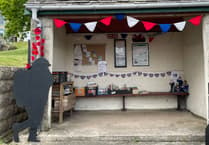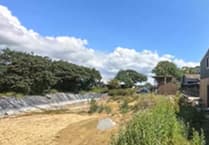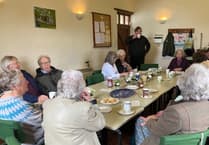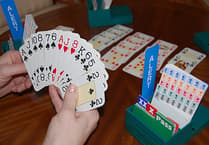A Pembrokeshire businessman is planning to appeal following Pembrokeshire County Council's decision to turn down his application for a public entertainment licence to re-open Chequers nightclub in Penally.
Following a marathon session on Tuesday, the county council's licensing committee also ruled that the applicant, Mr. Thomas Sinclair (Junior), of Milford Haven, was not considered a 'fit and proper person' at this time to hold a public entertainment licence (PEL).
The hearing at County Hall lasted over seven hours and was filled with incident, including the confiscation of a video camera under the Data Protection Act after it was claimed that supporters of Mr. Sinclair (Jnr) had used it to film the large gathering of protesters present from Penally.
The meeting also heard claims that police licensing officer Tony Davies was carrying out a 'vendetta' against the nightclub, after being seriously injured outside the premises while a serving police officer; and suggestions that the application included items that could be considered as criminal libel.
A county court clerk also arrived during the proceedings to serve an adjournment notice on Mr. Sinclair (Jnr) in relation to a bankruptcy hearing against him that day.
Mr. Sinclair was seeking a PEL to re-open the club - which has been closed for the last five years - on Friday and Saturday nights from 7 pm to 2 am between October 31 and March 31.
Capacity requested was 750, with 550 on the ground floor and 200 in the first floor balcony area.
The application has sparked a wave of protest in Penally village, but Mr. Sinclair (Jnr) spent almost two hours of the meeting arguing that the objections of local residents, and those of the statutory authorities, should not be considered as they were received 'late'.
He claimed that there had been no objections to the application within 28 days of a public notice appearing in the Tenby Observer last August.
This was, he said, a statutory time limit in the county council's own recommended wording for public notices of this kind, yet public objections before the committee had been received more than six weeks after the publication of the notice.
He argued that, if the application had been heard 29 days after the notice appeared, there would have been no objections to it lodged from the public.
It was pointed out by both Mr. Gareth Watts, principal officer in the county council's public protection division, and by Mr. Davies, that there was no time limit laid down by statute regarding public objections and that the full application had not been received by the county council until October.
Mr. Sinclair (Jnr) disputed this, saying that a notice of intent to apply had been with the county council in September, but Mr. Watts and Mr. Davies said that this did not contain sufficient information on the application to allow consultation.
The meeting also heard from Clr. Barry Jenks, chairman of Penally Community Council, who, speaking on behalf of the large group of residents present, said that objectors had wanted to send their views in on seeing the public notice in the press, but had been told by Mr. Watts to wait until the formal application had been received.
He said that the number of people present showed the genuine concern of the village and all wanted their observations to be heard.
Mr. Watts agreed that Clr. Jenks had been acting on his advice and there had been questions at the time of the public notice as to its legality, which had taken two months to resolve.
After debating the matter in camera, committee chairman Clr. Don Evans said that the committee had agreed to consider the views of the Penally residents in the "interests of natural justice."
Mr. Sinclair (Jnr) then claimed that the views of the statutory authorities should not be considered as they too arrived outside the 28-day time limit, final comments being received as late as December 6.
He claimed that the Chequers application was not being treated in the same way as other applications and that there had been "undue delays."
Mr. Watts said that his department had acted in good faith within legal advice throughout the application, but if Mr. Sinclair (Jnr) felt he had not been dealt with fairly he could make an official complaint.
Both he and Mr. Davies again stressed that they had not been able to consider the application fully until full details had been submitted in October.
It was, said Mr. Watts, incumbent on the applicant to submit as much detail on their application at an early stage.
Mr. Davies also pointed out that there was no time limit on statutory authority responses, with the county council compelled by law that they 'shall' listen to their views.
Committee member Clr. Terry Mills admitted he would be concerned if fellow members did not take on board the views of statutory authorities in the interests of public safety.
Following another 'in camera' session, Clr. Evans also agreed, due to the seriousness of the comments relating to public safety, that they would consider the views of the statutory authorities.
He also wondered, if he felt the application had not been handled correctly, whether Mr. Sinclair (Jnr) wished it adjourned, but he replied that it had "dragged on long enough" and wished the meeting to continue.
Clr. Jenks told the committee that the residents of Penally were not objecting to the applicant, but to the premises, pointing out that they had endured "horrific experiences" when the club was opened.
He cited people 'rampaging' through the village, gates and signs being removed and other various acts of vandalism.
He noted that the application was for November through to March, to solve noise problems at the neighbouring Crackwell Holiday Park, but he pointed out that unlike the caravan park, Penally was not closed for the winter.
The village already had one nightclub, with a capacity greater than the population on Penally's electoral roll.
"Please allow us the peace and harmony we have had since Chequers closed," he urged.
Mr. Malcolm Thomas, owner of Crackwell Holiday Park, also appeared before the committee to object.
He did agree with Mr. Sinclair (Jnr), however, that the park was closed during the winter months and he did buy the site during the time the nightclub was open.
The meeting was then interrupted by the appearance of a county court clerk to personally serve an adjournment notice on Mr. Sinclair (Jnr) in relation to bankruptcy proceedings due to be heard at Haverfordwest Crown Court that day.
Clr. Evans felt it was an apposite time to break for lunch while Mr. Sinclair (Jnr) took legal advice on the matter.
On return after lunch, Mr. Sinclair (Jnr) felt that this bore no relevance to his licensing application and suggested that the clerk's arrival had been 'orchestrated' in a bid to prejudice his application.
Following legal advice, Principality Taverns, on behalf of whom he was making the application, would be serving writs on three people for 'defamation of character' as a result, but as it was now a matter of public record that an application had been made to declare him bankrupt - an application he would contest - then he saw no reason why the meeting should not continue.
Turning to the suitability of the building, Mr. Watts revealed that the location of the premises posed a risk of noise nuisance, irrespective of who owned the licence.
Unregulated music, particularly low bass, was difficult to contain and just 50 yards separated the club from the first caravan at Crackwell.
The club was in a rural setting, with low background noise, and there had been several noise nuisance notices served under previous ownerships.
He felt that noise limiters were not the answer without major works to the premises and deemed it unsuitable from a sound insulation standpoint.
He felt that exodus of people from the premises in the early hours could cause problems to residents of Crackwell and also of Penally village, while the building itself was in a 'dilapidated' condition, due to the fact it had not been used for five years and there was water coming through the roof.
He noted that the premises had an electrical certificate dated 1999, but felt that a new one was required. He also felt a report was needed into the structural integrity of the building.
Mr. Sinclair (Jnr) pointed out that many of the concerns about possible noise on Crackwell would be met by the fact that the site would be closed during the proposed months of operation.
He also said that, while he was reluctant to disclose their names in public session, there were financial backers prepared to undertake some £100,000 of renovation works to the building before opening, although he added that they could not be expected to make this considerable investment if the building failed to acquire a licence.
Concerns over the car park and road were also addressed by Mr. Sinclair (Jnr).
The Fire Authority had some concerns over the means of escape from the first floor of the premises, with a survey needed as to the structural integrity of two metal bridges. They suggested that, if the application be granted, the numbers be limited to 441 on the ground floor and 161 on the first floor
Mr. Davies said that historically people leaving Chequers walked through Penally village rather than along the bypass as there were no verges.
When in the village these people "spread out like the tentacles of an octopus" and the police were "inundated with complaints about noise and damage."
"Things have changed, things have moved on since the closure of Chequers," he said. "We now have the Human Rights Act and people are entitled to their homes and privacy."
However, Mr. Sinclair (Jnr) argued that noise abatement notices on the premises in the past had not mentioned Penally village, only Crackwell Holiday Park.
As to whether to Mr. Sinclair (Jnr) was a 'fit and proper person' to hold the licence, there were heated exchanges between Mr. Davies and Mr. Sinclair (Jnr) over statements made by Mr. Sinclair (Jnr) in his application against Mr. Davies, which the police licensing officer felt could constitute 'criminal libel', and he called for him to back up his claims.
Clr. Mills felt that such 'friction' was not the way to proceed.
"We should be looking at the suitability of the applicant, not Mr. Davies," he commented.
Mr. Davies presented two instances when licences had been revoked at the nightclub for serious public order or public nuisance incidents, but Mr. Sinclair (Jnr) replied that this only reflected on the suitability of the previous licence holders and not his abilities.
However, Mr. Davies said that, if Mr. Sinclair (Jnr) did not accept that there had been problems in the past, what would he do to stop such problems in the future.
Mr. Davies also claimed that Mr. Sinclair (Jnr) had made a false declaration on his licensing application form in that he had not disclosed convictions or cautions.
Mr. Sinclair (Jnr) admitted that he had been given a conditional discharge for using a loud speaker in the street, but he had thought that this was a civil matter not a criminal one.
He also admitted several cautions and a speeding fine which he had not disclosed as he had not thought them relevant, although Clr. Evans commented that to have disclosed them, whether he needed to or not, would have shown his honesty.
Mr. Davies suggested that Mr. Sinclair (Jnr) was working for Principality Taverns, while claiming benefits, but Mr. Sinclair (Jnr) said that he was doing so voluntarily, as it could lead to a job, and the DSS were aware of the situation.
Further investigations by Mr. Davies also revealed that Mr. Sinclair (Jnr) was being investigated by the county council's own trading standards department and Dyfed Powys Police fraud squad, but Mr. Sinclair (Jnr) said that he did not see the relevance, as he had not been charged with anything.
He explained that he was a trained manager with BII certificates and had considerable experience as an event promoter, so much so that, when a licence for a two-day festival had been granted to another person by the committee last year, it was on the proviso that Mr. Sinclair (Jnr) assist him.
Mr. Sinclair (Jnr) suggested that, as Mr. Davies had been injured outside the club while a serving officer, he was carrying out a vendetta against it.
He withdrew his remark on the insistence of Mr. Davies, suggesting instead that he may not look so favourably on the premises as someone else would.
Mr. Watts said that it was almost unprecedented for his department to recommend refusal of an application both on suitability of premises and the applicant.
He cited several dealings he had had with Mr. Sinclair (Jnr) in the past in his capacity as Evolution Experience promoter where Mr. Sinclair (Jnr) had appeared to ignore the advice being given by county council officers.
"If Mr. Sinclair (Jnr) is a responsible licensee he would take advice from experienced officers, not disregard it," said Mr. Watts.
"He continually apportions blame elsewhere, but it is not the county council's fault if we have to take action because he has sat back and hoped the problem goes away."
Mr. Watts said that in his experience of licensing, applicants were usually 'transparent' in their applications, but it had taken "weeks or arguing" with Mr. Sinclair (Jnr) before officers could gain access to Chequers for a site inspection.
"Is this the sign of a reasonable person who wants to work in partnership with the various bodies for the safety of all people in this county who should attend his licensed premises?" asked Mr. Watts.
After considering in private session for some 50 minutes, Clr. Evans said that the committee had taken on board the views of the people of Penally and what officers had said and refused the application on the grounds of the premises suitability and location.
While commended on the way he had conducted himself and the work he had put in to the application, the committee also felt that Mr. Sinclair (Jnr) was not a "fit and proper person to hold the licence at this juncture."
Clr. Evans also said that he was unhappy that aspersions had been cast against council officers and the police during the course of the meeting.
"It is a shame it had to happen," he said.
Speaking after the meeting, Mr. Sinclair (Jnr) said he would be appealing against the decision.



